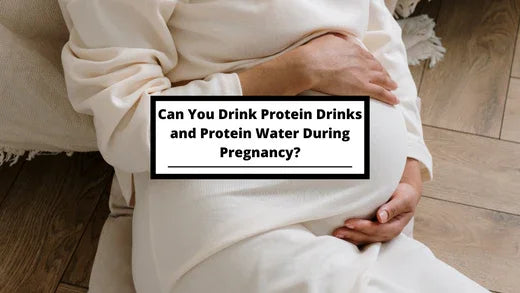Can You Drink Protein Drinks and Protein Water During Pregnancy?

Pregnancy can be a challenging time for any expecting mother. During this period, the woman bearing the baby must ensure to provide proper nutrients to herself to not hinder her baby's growth. Even the slightest lack of vitamins can give birth to a lot of risks. Getting enough protein is also essential for the mother's health.
During pregnancy, many women like to keep themselves healthy which includes maintaining muscles and not let excess fat to accumulate. What's that one thing we all turn to, to build muscles? Protein drinks! So, can you consume protein weight loss shakes during pregnancy? Let’s find out!
The Need for Maintaining an Appropriate Diet during Pregnancy:
For a healthy pregnancy and proper growth of the baby, it is necessary that every need of the body gets fulfilled. These needs mostly include getting proper nutrients such as protein, calcium, vitamins, etc.
An appropriate diet is also important to ensure good growth of the baby's tissues and organs. A pregnant woman must incorporate 300 extra calories in her diet. However, she must also make sure that those extra 300 calories are coming from healthy sources rather than junk food.
Everyone wants their pregnancy and the baby's delivery to be smooth as possible without any complications. Having an appropriate diet filled with the right proportions of nutrients is necessary to ensure that because now you are eating for two.
The Role that Protein has to Play during Pregnancy:
Protein is a nutrient that is important to maintain good health. It contains amino acids that are necessary for cell development and metabolism. So naturally, that makes protein play an integral role during pregnancy. Every nutrient has some role to play during pregnancy, however protein makes sure to keep both the baby and the mother in good health.
The tissues and organs of the baby need appropriate amounts of protein to grow efficiently. The brain needs the most nutrients to grow - it helps form healthy hair, bones and nails of the baby. It is also necessary to produce hormones and enzymes because it affects proper fetal development.
For a pregnant woman, the role of protein is just as important as it is for the baby’s growth. It helps the tissues of the breast and uterine to grow. Protein produces red blood cells which carry and transport oxygen to the organs and tissues. So protein helps to increases the blood supply, and in a way, it makes sure that the baby is getting an adequate amount of blood too. It helps to keep the blood glucose levels stable and hence lowers the risk of gestational diabetes(1).
Severe cases can lead to intra-uterine growth restriction, postnatal growth reduction, and embryonic loss if there's an inadequate amount of protein in the body(2).
- How much should you consume protein while being pregnant?
During pregnancy, you should make sure to consume at least 70 to 100g of protein a day. The need for proteins of the body increases with each passing trimester. So, make sure to talk to your doctor before increasing your protein intake.
Good protein sources you can include in your diet include chicken, fish, peanut butter, cottage cheese, beans, and nuts.
If during pregnancy you’re struggling to meet your protein targets and are looking for a solution. Try incorporating protein water or other protein drinks or supplements into your diet.
The benefits of protein consumption during pregnancy:
Protein is necessary during pregnancy to ensure the baby's proper growth, and it keeps the mother healthy too. Here are some benefits of protein consumption during pregnancy.
- Amino acids, the building blocks of protein, ensure the healthy development of your baby. This is because amino acids are responsible for normal cell growth and metabolism.
- The healthy birth weight of the baby is important to prevent the risk of life-threatening diseases such diabetes and obesity.
- There have been over 20 studies conducted to overlook the importance of protein on the baby’s growth. The result of these trials concluded that protein has a direct relation with the baby’s weight and why is protein so important during pregnancy.
- Protein is responsible for producing hormones and enzymes that are necessary to perform everyday functions.
- Protein reduces complications that can occur during and after pregnancy, at the time of delivery as well. This is because of amino acids, maintain the growth and strength of muscles and bones which makes the point more clear that why is protein important during pregnancy.
- If any damage to the baby’s tissues occurs during pregnancy, protein helps repair to repair that.
- Protein helps to prevent pregnancy swelling.
- It ensures a strong development of the immune system. Because protein is responsible for the making of antibodies.
Is there a risk of “Protein Overdose”?
If not taking enough amounts of nutrients in your body can impose risks to your health and the baby's during pregnancy. Then, of course, taking high amounts can have the opposite effect. Hence doctors focus on making sure that whatever you take during pregnancy is appropriate amounts to not hinder the baby's growth because you need to know what constitutes as eating too much protein.
If you consume high amounts of protein that leads to 'protein overdose,' then it can cause neonatal or fetal death. Although this only happens in extremely rare cases, some researchers have linked the cause of miscarriages to protein overdose. If not miscarriages, then protein overdose can cause risks in pregnancy which can be fatal to the mother’s life as well.
Hence, you must check in with your doctor before incorporating any course of supplements into your diet. This will make sure that you're on the right track of your pregnancy and will also prevent any overdose of nutrients.
The Final Verdict: A Wholehearted YES Backed by Science
Consuming protein weight loss shakes during pregnancy is absolutely safe, both for the baby and the mother.
In most cases, women don’t understand the importance of incorporating enough protein into their diets. This leads to many risks during pregnancy which can cause a threat to the baby’s life. Protein water and collagen drinks are a great way to make up for that. Such drinks provide an easy way for the body to meet its protein needs.
The majority of pregnant women suffer from morning sickness during pregnancy, especially during the first trimester. This leads to them not getting adequate nutrients into their body as they feel nauseous all the time. When the body’s basic nutrient needs don’t get fulfilled during the first trimester. The rest of the pregnancy becomes difficult and full of hurdles to pass through. Consuming drinks rich in protein will help them get enough amounts of protein to ensure the healthy growth of their baby.
Delivering a baby is not an easy job, and postpartum recovery takes most of the energy out of women. When dealing with this phase, many are unable to get proteins into their bodies. Other than that, these women also have to ensure to incorporate protein without causing more weight gain. Protein foods for the weight loss list include eggs, low-fat dairy, seafood, and beans.
However, make sure to consult a doctor before incorporating anything into your diet. Especially when it comes to protein shakes and drinks. Even though they are safe for consumption, consulting with a doctor is must.
If you are planning on taking protein water, please note to only take them if your body is lacking proteins. Otherwise, taking proteins more than your requirements can lead to protein overdose.
- FAQS
- How can protein affect pregnancy?
Amino acids, which are the building blocks of protein, are responsible for a number of things. This makes protein play an important role during pregnancy. Apart from being responsible for the proper functioning and growth of the baby's vital organs. Protein also helps form the baby's skin, fingernails, muscles, and hair. Protein can help prevent swelling in different body areas for the mother, which is quite common during pregnancy. It also helps to maintain blood pressure.
- Does the need for protein increase during pregnancy?
Since protein is responsible for the growth and development of the baby. Then quite naturally, as the baby grows with your pregnancy, the need for protein increases too. This need increases with each trimester.
- Can pregnant women consume protein drinks?
If the pregnant woman is suffering from a lack of protein and is unable to eat protein-rich foods due to pregnancy complications. Then yes, she can consume protein drinks to make up for its loss.
- What should pregnant women look out for when consuming protein drinks?
A pregnant woman should look out for hidden sugars in her protein drinks. Sugar won't only cause her unhealthy weight gain but will also increase her blood glucose levels. Since the baby's blood supply is dependent on the mother, there is a high chance for the baby to get diabetes.
- What complications can occur during pregnancy if there isn’t enough protein in your body?
During pregnancy the amino acids are responsible for maintaining the muscle mass and strength of the baby. Lack of protein in a pregnant woman's body can make the baby weak. It can also slow down its cell metabolism as well.
Protein can prevent anemia in pregnant women since it is responsible for producing cells needed to transport oxygen in the body. If by any chance the mother develops anemia, the baby is at a risk too which can cause fetal death.
Not having enough protein can also lead to miscarriages at the early stages of pregnancy.
Are you looking for an easy protein supplement that you can drink on the go? VIeve Protein Water has 20g protein, zero sugar dairy or fat and only 90 calories per bottle. Now available in a Vegan Protein Water version.
Check out our shop to choose from a variety of products that we offer or browse our website for more details about our range protein water that can help you meet your fitness goals. Vieve Protein Water is available in the UK from Amazon, Ocado or Holland & Barrett.
References
- Elango R, Ball RO. Protein and Amino Acid Requirements during Pregnancy. Adv Nutr. 2016 Jul 1;7(4):839S-844S.
- Herring CM, Bazer FW, Johnson GA, Wu G. Impacts of maternal dietary protein intake on fetal survival, growth, and development. Exp Biol Med [Internet]. 2018 Mar 1 [cited 2022 Apr 2];243(6):525. Available from: /pmc/articles/PMC5882021/
